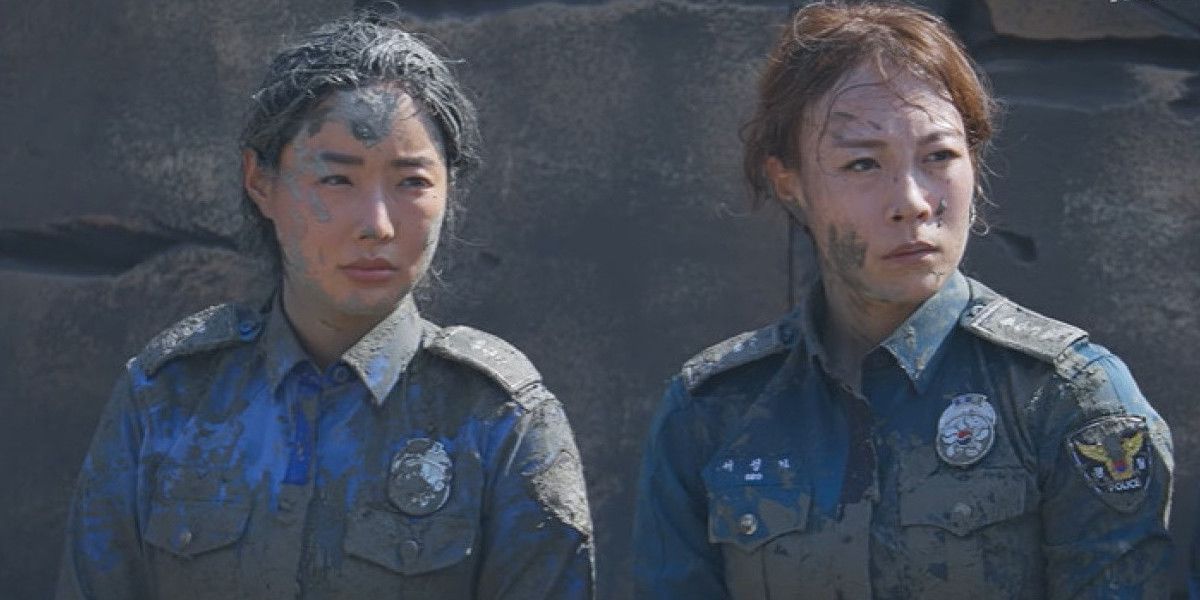24 contestants, grouped into teams of four by profession – police, soldiers, firefighters, bodyguards, athletes, and stuntpeople – trek across a one-kilometer mudflat, then turn to watch the tide come in, flooding the path and leaving them stranded on an island. This is the premise behind Netflix’s newest experiment, Siren: Survive the Island. For seven days, they’ll compete in two types of events: Arena Battle, head-to-head challenges involving strenuous physical activity which grant the winning team an advantage for the Base Battle, initiated when a siren sounds and each team’s flag is vulnerable to capture, resulting in elimination. After choosing a base on the island, the teams hide their flag and raid the other bases. It’s a setup similar to The CW’s Capture, a one-season reality competition show from that network’s experimental era, only pitched toward map-making, fortification, and surprisingly violent sieges. In the very first Base Battle, two teams ally and assault a third base, taking the flag after smashing a window, neutralizing a guard, and pilfering through the base like it’s a pharmacy in a zombie movie.
- ‘To Catch A Predator’ Ended 15 Years Ago, But Chris Hansen Never Stopped Hunting
- Why We Need More Reality TV Like ‘Couples Therapy’ and ‘Couples Retreat’
- ‘RHOA’: A Full Recast Needs To Happen To Salvage the Franchise
- ‘Drag Me to Dinner’: Release Date, Trailer, Cast, and Everything You Need to Know
- ‘The Bachelorette’: What to Remember from Charity’s Time on ‘The Bachelor’
When the dust settles and there’s shattered glass all over the floor, a few questions arise. “Was that a legal maneuver? Is everyone safe here? What are the boundaries of this game?” These were the very same questions asked during Netflix’s previous Squid Game-style competition, Physical: 100. That show felt like a sea change in South Korean reality programming, in terms of its production design and cinematic style, but the eerie atmosphere meant that so much was purposely obscured. No on-screen host, and only the briefest explanations of the rules and even the contestants. Never once did a player discuss a personal hardship to be rectified by the prize money. There were no spiteful rivalries, no backstabbings – no hookups! In fact, a number of the contestants had preexisting relationships with each other, whether friends or coaches, and none of that information was forthcoming. Instead, the contestants were characterized entirely in present tense. They were compelling because of what they did, not for who they were. And especially compelling were the show’s women, who made up less than a quarter of the titular 100, but did a hell of a lot.
‘Siren: Survive the Island’ Subtracts Men and Adds Violence
So where South Korean pop culture is fascinated by bodies made thin by dieting, instant icons like wrestler Jang Eun-sil and fitness coach Shim Euddeum counteract the rigidity of the country’s beauty standard with muscles and power. Physical: 100 was guided by a question: “What is the definition of strength?” Thanks to the incredible performances of the contestants, found that the definition is broad and accessible. Size and shape don’t matter, especially when an athlete’s only true adversary is themselves. Women are strong, too. They can do anything. On Siren: Survive the Island, those 24 contestants are all women, and they’re putting this to the test. It’s another reality competition with a disembodied host, atmosphere, cliffhangers, and – at first – understated contestants. In fact, there’s even one carryover: Sergeant Kang Eun-mi, a special forces soldier eliminated early in Physical: 100 by Jang Eun-sil in a one-on-one match that admittedly favored Eun-sil’s specialty.
On Siren, Eun-mi is part of a team, including fellow soldiers she’s served with. While initially, all 24 women are the familiar quiet, respectful contestants, very quickly the battle lines are drawn. It starts out complimentary, with quips like “The bodyguards are so charming,” or “Team Stunt is fast, and they’re quick-witted,” but these give way to “Athletes don’t call each other ‘ma’am.’ They must be Team Guard.” They’re observing each other, assessing behaviors and patterns. Where the players of Physical: 100 begin and end as individuals with some grouping in between, the team dynamic of Siren must be creating a stronger sense of in and out-groups. Pretty soon, Team Soldier passes an injured player in the wilderness between bases and snickers about it. That’s good news! It doesn’t help that the game is designed for direct altercation, with grabbing hands and even martial arts. In one tense Base Battle, a member of Team Stunt out-grapples an Athlete as two allied teams bash against the front door. It was a moment of beauty amidst the chaos.
‘Siren: Survive the Island’ is a Wild Ride
One major upgrade is that the scenario of Siren: Survive the Island actually seems fun. Very few of the challenges on Physical: 100 were enviable tasks, whether hanging from a bar for 15 minutes or doing an endless shuttle run. Siren is a throwback to the schoolyard, or neighborhood manhunt. In between the Base and Arena Battles, contestants do recon, imbuing each scene with the tension of whispers in the dark against the din of insects. They crouch and inspect maps under flashlights, and a twig snaps somewhere nearby. The Base Battles generate imagery reminiscent of Assault on Precinct 13. Players break things and scale walls. In one scene, a fight breaks out on the roof of a base, threatening a one-story fall with every move. Like with Physical: 100, these events are also generators for portraits of humanity. Team Firefighter might be scrambling toward an enemy base when they converge on Team Athlete in the woods. They’re forced to negotiate an alliance in a matter of seconds, despite that such proximity makes them vulnerable (removal of a personal flag eliminates a player temporarily). Together, they rush onward, and Kim Hyeon-ah, the charismatic leader of Team Firefighter, bounces as she shouts, “Let’s give Team Athlete a win today!”
On the other hand, as Firefighter and Athlete begin to turn the tide on the defending base, one of the besieged players cries out for help, the agreed upon code word “Potato!” Two allies arrive, but assessing the situation, decide against intervening. Later, they deny ever forming an alliance with the now-eliminated team, even amongst themselves. Is it cowardice or strategy? Either way, it’s great television. It’s exactly what Squid Game was doing, asking the viewer, “What would you do in this situation?” Of course, Squid Game was a scripted narrative, so it also did dramatic payoffs, but what’s a better payoff than victory? It can’t be easy to make a game of marbles so suspenseful, even tragic, or in the case of Physical: 100, a shuttle run so harrowing. With Siren, the Arena Battles are also undergirded by story. After Hyeon-ah is injured by – you guessed it – falling one story, she volunteers to enter the arena first for a wood-chopping challenge. 30 pieces of wood, split into quarters, and that’s only the first part. She says that if she gets tired, someone else can relieve her. However, teammate Jung Min-seon intercedes to take her place. Her friend’s injury had clearly shaken her, and every exhausting swing of the axe is one more that Hyeon-ah is spared.
On ‘Siren: Survive the Island,’ the Women are the Stars
In 1948, the U.S. military instituted its Combat Exclusion Policy, banning women from combat roles. It was lifted by the Pentagon in 2013, after 65 years of arguments back and forth. In some corners, these arguments surely persist, and they’re likely consistent across every male-dominated field. Physical: 100 deconstructed one of the peskiest arguments, the premium we put on biological difference, but did so by pitting women against men. Siren: Survive the Island features women exclusively, so there’s no internal comparison, no difference to overcome. And yet, the present tense remains. These are still the kinds of low-key reality TV stars who point out that a crab encountered on a walk is “fascinating” because it’s so far from shore, but then they’re saying things like “Our bodies are our weapons” with the same lack of irony, the same authenticity. Physical: 100 democratized the concept of “strength” and Siren applies it. The argument is over. The story of these 24 badass women is like a glimpse into an alternate dimension where the argument never took place, or better yet, a glimpse into the future.
Source: https://dominioncinemas.net
Category: REALITY TV












